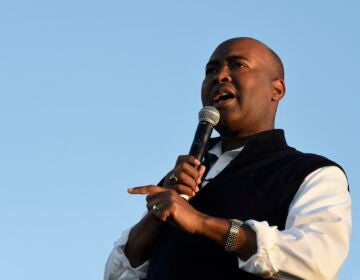Biden ethics order marks departure from Trump administration
The new ethics rules, which were described by an official on Biden's transition, aim to not only restore Obama-era practices but strengthen them.

President-elect Joe Biden and his wife Jill Biden are greeted by Delaware Adjutant General Michael Berry and his wife Gen. Karen Berry before they board a plane at New Castle Airport, Tuesday, Jan. 19, 2021, in New Castle, Del. (AP Photo/Evan Vucci)
President-elect Joe Biden will issue an executive order after taking office, aimed at reinstating White House ethics standards that were diminished or disregarded by the Trump administration.
President Donald Trump campaigned on draining the “swamp” of entrenched influences in Washington. Yet in practice, the Trump administration weakened ethics rules and failed to enforce those he adopted, government watchdog groups say.
The new ethics rules, which were described by an official on Biden’s transition, aim to not only restore Obama-era practices but strengthen them.
They are intended to minimize the ethics minefield posed by the “revolving door” of incoming former lobbyists and consultants who typically staff presidential administrations, as well as the future employment of departing officials who often find lucrative jobs in Washington’s influence industry.
The official who detailed the new rules spoke on the condition of anonymity because Biden is not yet in office and the order, which was first reported by The Washington Post, has not yet been made public.
Under the order, officials who leave the administration will be prohibited from lobbying the White House for Biden’s duration in office. Those who depart toward the end of Biden’s tenure will be prohibited from lobbying the White House for at least two years.
In some ways, the new rules go further than those that governed Obama’s administration.
One provision prohibits incoming administration officials from accepting “golden parachute” payments from their former employers for taking a government job.
Another restricts former senior level staffers not just from lobbying the White House for at least two years, but also prohibits for a period of one year working behind the scenes to materially assist others who do lobby the administration. That’s a practice often referred to as “shadow lobbying.” Typically such people do not have to register as lobbyists, even though they play a key role.
“It fixes many of the things that Trump broke and even breaks new ground in building on the Obama executive order,” said Norm Eisen, a lawyer who served as Obama’s ethics czar.
Still, Eisen said Biden must zealously enforce his own policy in order for it to work.
“It is a significant step forward if it’s enforced,” Eisen said.
Yet one key area that Biden has not addressed in detail is how his White House will address potential conflicts of interest posed by members of his family, some of whom have personally profited by leveraging the Biden name.
On the campaign trail, Biden repeatedly said that during his decades in public office, he has never talked to any family members about their private business dealings. And he promised “an absolute wall” between government and his family’s financial interests.
But specifics of how his pledge will be enforced remain unclear.
A person familiar with the incoming administration’s plans said Biden’s family members will not serve as employees or as board members for foreign companies. Additionally, the person said there will be a review process to ensure the Biden family’s business dealings do not present even the appearance of a conflict of interest.
The person insisted on anonymity to discus internal deliberations.
Biden’s son, Hunter, has worked for foreign governments in the past, including serving on the board of the Ukrainian gas company Burisma when Biden was Barack Obama’s vice president. Hunter Biden is currently under investigation by the Justice Department, which is probing his finances, including some of his Chinese business dealings.
Biden’s son-in-law Howard Krein, who is married to his daughter, Ashley, is a high ranking executive at StartUp Health, a venture capital and health tech firm, which lobbied the government on health industry technology regulations.
And his brother James has repeatedly found lucrative work over the years by invoking the Biden name.
Family members also serve on two nonprofits, The Biden Institute at the University of Delaware, and the Beau Biden Foundation for the Protection of Children.
“The conflict of interest is there,” said Craig Holman, a government affairs lobbyist with good-governance watchdog Public Citizen. “As long as the Biden family is in charge of a nonprofit it provides an opportunity for special interests to make large donations to that foundation in the hopes of currying favor.”
Holman otherwise praised Biden’s ethics order as a “night and day” difference from Trump.
The ethics concerns faced by the Biden administration also don’t match those that vexed the Trump administration. That includes the president himself, who made it easy for foreign and domestic interests to try to influence U.S. policy when he retained his stake in his private real estate company.
Other provisions in Biden’s ethics order include:
— A prohibition on interfering with prosecutorial decisions made by the Justice Department. This measure comes after Trump repeatedly sought to influence the Justice Department’s prosecution of his allies and former administration officials, but could also apply to the current investigation of Hunter Biden.
_A two-year ban on all incoming appointees working on matters related to their former employers or clients, including regulations and contracts.
— A two-year prohibition on incoming former lobbyists, or those who were registered as a foreign agent, from working for agencies they formerly lobbied.
— A “revolving door” ban on former senior appointees that prohibits them from contacting their former agency, as well as senior White House officials.
— A requirement that any waiver granted that exempts an appointee from ethics rules be made public.

Get daily updates from WHYY News!
WHYY is your source for fact-based, in-depth journalism and information. As a nonprofit organization, we rely on financial support from readers like you. Please give today.





